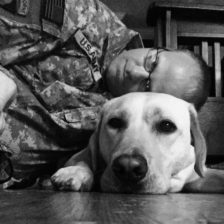Did you know that the National Alliance on Mental Illness has a Stigma Free campaign? I only read about this yesterday. I realized that the perception of mental illness won’t change if we (society) don’t act to try and change it. But change is hard, am I right? And sometimes if we don’t see a quick result, get a quick answer or “fix,” well, then we just go about our business as usual.
So what does it mean to be “Stigma Free?” Well, because of stigma, those who experience mental illness are often labeled and seen as their condition–and nothing more. They are often held responsible for their condition, expected to change their new thoughts and behaviors, avoided, isolated, viewed as unpredictable, erratic, and sometimes dangerous, and at times, they are considered incapable or unable to make a rational decision.
After reading all of that…I couldn’t help but think, “there are some people who believe those very things about veterans, too.”
Yes, you read that correctly. People give a label or try to categorize veterans. I recall reading an interview with author Phil Klay, a Marine veteran, who was told he would probably snap in about ten years after being home from the war. He was deployed in Iraq, and was not diagnosed with PTSD; however, that didn’t stop a total stranger from telling him that he was “damaged” because he served.
Wake up, people.
Living with a mental health condition is already challenging, adding the burden of a stigma is dangerous. I’m sure you’ve heard, read, or maybe even experienced someone who has taken their own life, and according to the CDC, more than 41,000 individuals take their own life each year. We need to stop the stigma, fight it, and prevent suicide.
Stigma Free is not some creative marketing campaign to bring attention and awareness so we can view this “issue” as something that will pass. This is an approach to mental illness–and thinking about actions, words, tone, and behavior can really help.
Be open to conversation about mental health. I sometimes don’t like having to say or talk about PTSD, but it is part of my life because Sam has PTSD. That isn’t going away anytime soon. We can talk about it–the triggers, the panic, the anxiety, and we can do things to make life easier with PTSD. At one time, cancer was very “taboo,” but through open and honest conversations, that can lead to de-stigmatizing mental health. The more we talk, the more normalized the conversation will become (basically, communication is key, y’all).
Be respectful with language. Language is all around us. Words are powerful. They can heal and they can harm (regardless of what you thought about words never hurting you, they can). Realizing that a person is not defined by a condition—that is big, folks. Sam is NOT defined by PTSD, and it does NOT own his life. But, there might be people who view him as a disabled veteran with PTSD. Be cautious about sensitive topics (like PTSD, for example). Don’t ask a veteran how many kills they had during their service, or if they have PTSD (and it happens, it really does). When you hear harmful language, let someone know. I’ve mentioned that we hear all sorts of things when we are out in public with Memphis, and at times, we have educational moments.
Try not to refer to someone as “crazy,” “psychotic,” or “insane.” For people who go though some really tough times, tough symptoms, or conditions, it can be harmful to be labeled. Not all veterans are going to snap, as Klay was told. Not all veterans want to hurt others, and most importantly, veterans do not want to be labeled into a specific category (like “crazy”). We don’t need an “us versus them” narrative–we just don’t.
Understand what you might not understand. It is easy to think “oh, I know about that,” or “they are just exaggerating or making that up for attention,” but really living with a mental health condition makes every day tasks very challenging–work, communication, family, friends, getting out of bed—remember the saying “be kind, everyone you meet is facing a battle?” Yeah. That. Be kind. Try to be understanding, empathetic. Don’t pity someone. Klay wrote an excellent article about treating Veterans with respect, not pity. You can read it here: https://www.wsj.com/articles/treat-veterans-with-respect-not-pity-1400856331
Be supportive of recovery. How important is this? Very. Feeling supported is so essential for someone in recovery. Stigma is not understanding or supporting. Stigma is avoiding and trying to take an easy way out. It is so huge when a person facing a mental health issue seeks help. Support them–it is hard to konw what to say, and it is stressful at times, but saying, “just snap out of it!” is so.not.helpful. Support is big. Being there for someone when they need you the most–big. Listening–big. Encouraging someone to seek help is big, too. I know Sam struggles at times with the idea of therapy, working on problems, not bottling up, or talking to me–but we are team. I am with him 100%, no matter what. I want him to know that he can talk to me, that I support him, and that I care about his overall health in addition to his mental health.
Try to end the stigma. Try to educate and understand. Be open to a conversation and communication about uneasy topics from time to time. I promise you this, it won’t be easy, but it will be worth it.


